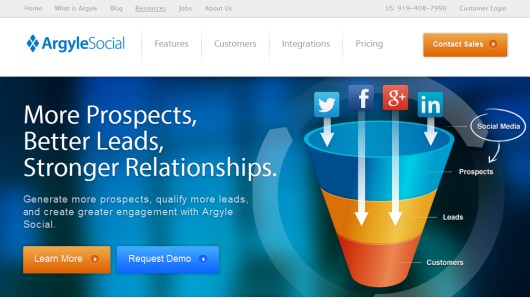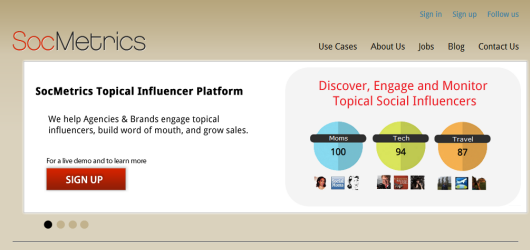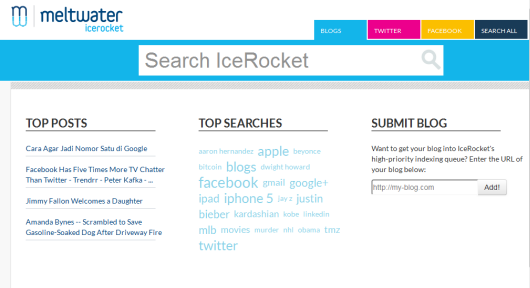8 Tools You Need to Succeed in Social Media
 As regular readers of this blog are likely aware by now, I recently started working on building up my Klout score. It’s been going pretty well. I’ve added seven points to my score since I started working on it. This is largely because I’m making myself much more available on Facebook and getting likes for my posts. However, there is a whole lot more that I could be doing in order to build myself up even further.
As regular readers of this blog are likely aware by now, I recently started working on building up my Klout score. It’s been going pretty well. I’ve added seven points to my score since I started working on it. This is largely because I’m making myself much more available on Facebook and getting likes for my posts. However, there is a whole lot more that I could be doing in order to build myself up even further.
The problem of course is a matter of time. Like everyone else on the planet, my time is limited. While building a higher Klout score may help me make more money in the future, in the short term, it doesn’t pay the bills. Plus, if I spent all my time trying to do the social media thing, I would never be able to do anything else.
Fortunately, there are a great many tools out there which can help you to deal with the problem effectively. I did some research and found eight tools you simply need to have if you want to succeed in the world of social media:
TweetReach
Ever wondered just how many people are actually seeing your tweets? I don’t just mean how many people subscribe to your feed or how many times your tweet was retweeted. I mean how many people actually saw it either because they subscribe to a feed from someone else who retweeted or because they happened to find it in a search or just by browsing a trending topic.
It’s well nigh impossible to glean this information directly from Twitter but with the help of a little known product called Tweet Reach, it’s easy to do. They’ll tell you how many people were actually effected by the tweets that you sent out and how many tweets you needed to send out in order to hit up that many people.
This can be incredibly useful for tracking just how effective your Twitter strategy is so that you actually build yourself up and get more of the retweets and reach that you really need. Not to mention that building your clout on Twitter will improve your overall Klout score.
This in turn can open additional doors for you in the form of media interviews or job offers depending on what you do for a living and what you sell. Best of all, for low volume users, the service is completely free of charge.
ArgyleSocial
I am loving this site more and more though it works best when you have a team as opposed to a one man shop. In essence, Argyle is designed to allow you to track multiple team members and multiple social accounts. The way it works is that it tracks all of your Facebook and Twitter accounts and allows you to delegate jobs to different people on your team.
That part, I’ve not found to be particularly useful for my own needs because I don’t have a big enough team to need the collaboration feature. However, what I love is that is can aggregate information from your different social accounts and actually tell you how well your efforts are doing. This way, you can have a real time performance chart which can be compared over time so you know if you are hitting targets.
The other thing that I loved about this product as someone who works as a freelance writer and consultant is that it allows me to track multiple company accounts. This means that I can manage the social accounts for a large number of different customers and even hire a team as the workload gets bigger. However, at the same time, I can still see an overall picture of how all our efforts are doing.
TweetLevel
Okay, I know what you’re thinking – not another Twitter tool. I mean there seem to be 12 different choices of tools for pretty much everything you need to do on Twitter and indeed, Tweet Level does at least one thing that you really don’t need an extra tool to do. It allows you to search for and follow conversations based on hash tags.
Of course, you can do that easily enough using Twitter’s own tools which is why I at first dismissed this tool as useless. That is until I noticed that in addition to allowing you to find conversations based on hash tags, it also allows you to find out how influential a given Twitter user is after you find them.
To illustrate, let’s say that you wanted to follow all the conversations about the Penguin update in Google. Okay, there are likely hundreds of thousands if not millions of them going on at any given time. Now who do you choose to follow based on their hash tags? It’s silly to follow every Tom, Dick and Harry who mentions Penguin after all.
Enter TweetLevel. They’ll tell you who is worth following and whom you can likely get away with ignoring. By following the industry leaders in any given trending topic, you are both more likely to gain key insights and possibly a mention on their Twitter feed if you happen to have something to say which is interesting.
Traackr
Continuing a trend of trying to find useful URLs by basically misspelling common words, Traackr is designed to do exactly what it sounds like – track who’s who in your industry. Basically, this is a specialized search tool which can look across multiple social networks and figure out who the most influential people are in any given area of interest.
This means for example that I can pop in the word SEO and find out who the top people are to follow in this field. There are two options in the Traackr application. The first option allows you to see whom to target if you are running an ad agency while the second one is designed for people who run a brand name within an industry.
The difference between the two options seems to be pretty subtle though. Basically, the ad agency one is designed specifically to find out who is most likely to be an influencer in your industry so that you know whom to offer freebies to. The brand version of Traackr is designed to allow you to find useful information across your industry. As I said, the difference between the two is fairly subtle but important all the same.
Traackr also allows you to see how these influencers are reacting to your own social media comments so that you know whether or not you are making an impact on the people who matter most for your business.
SocMetrics
I’m not entirely certain I’m sold on SocMetrics as an essential tool. Yes, it is a pretty nice suite of tools for those who need to find influencers in their own area of expertise but you can do something similar with a number of other products, including Klout, which I’ve written about extensively in the past.
That having been said, I do like one feature in particular at SocMetrics which I have not seen elsewhere and that’s why it made this list. They offer what they call a competitive influence feature. In essence, this means that you can make a list of influencers and then actually compare how influential they are in specific areas of interest.
So for example, you might initially put together a list of people who are influencers in the field of SEO but then, once you have that list, you’d want to drill down a little further and find out who is an expert in Bing. With other tools, you could do a separate search entirely for that keyword but with SocMetrics, you can actually refine your initial search and find out who has this specific area of expertise.
There is also a feature which allows you to “validate” the influence of the influencers that you found but I’m not sure I really understand why this is important. Either they are considered experts in their fields or they’re not. If any of our readers can explain to me why this matters so much, I’d love to know what you think.
Social Mention
Okay, I admit that this one is pretty cool. Yes, you can manually do a search for your company name across a wide variety of different websites with social media. However, this thing acts kind of like Google New Alerts for social media. Basically, you can put in any kind of a keyword (although your company name or your personal name are usually the most appropriate) and then do a search for it on this site.
The big advantage is that it allows you to see exactly when you are being mentioned and where. Plus, you can also do a further search through the site and see whether their algorithm tagged the mention as being negative, positive or neutral. I’m not clear exactly how this decision is made though. I assume it has specific keywords it looks for in order to decide if a mention is positive or negative so it’s obviously not perfect.
Finally, be sure to sign up for the alerts section which works exactly like Google News alerts. They’ll send you a notice on a regular basis of every mention of your keyword in social media so that you know when you’ve been mentioned and in what context. Not only can this help you keep your finger on the pulse of the social media world vis a vis your own company but it can also allow you to respond when something is mentioned about your company.
Ice Rocket
This one is also a pretty cool service to keep around. Ice Rocket is a blog search engine. It lets you find current articles across millions of blogs which are focused on your particular subject area. This allows you to quickly locate blog posts on major sites which feature some mention of your niche.
You can then go there, read what was written and leave an intelligent comment. Get it into the first ten comments on the page you are more likely to get traffic from it.
However, Ice Rocket also takes things a step further and allows you to search across social media as well. It’s a little similar in this respect to Social Mention but I think there’s still a value in using both because Ice Rocket includes blogs and also seems to have some additional features that I didn’t see at Social Mention. However, I did not see an alert feature here which is why I also like Social Mention.
RapLeaf
So you have yourself a pretty nice e-mail list which you send out regular updates to. Perhaps you send out a monthly or weekly newsletter. Or maybe you’re sending out a course of some kind. Doesn’t matter. Bottom line, you likely have a list of e-mail addresses and names and not much else. Wouldn’t it be nice to capture some demographic data about your customers?
In comes RapLeaf, which does exactly that. Basically, what they do is, they take your e-mail list, compare it with registered public e-mails on various forms of social media and then generate a demographic report for you. With this, you may learn that the majority of the people signing up for your e-mail list are in the northeastern part of the United States or that they’re actually all in India.
As they say, knowledge is power. With this information in mind along with the knowledge of which social networks most of your customers are signed up for, you can then go ahead and start targeting your e-mails much more accurately to reflect what people in these areas and networks are interested in
Bottom Line
Social media is an important part of any online marketing business. It’s also fragmented and takes time to keep track of. While these tools won’t completely eliminate your need to spend time building your profile on social media, they can and do help with ensuring that you get the most bang for your buck.

